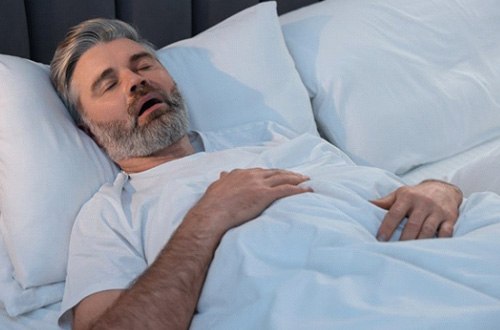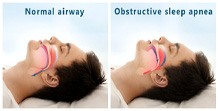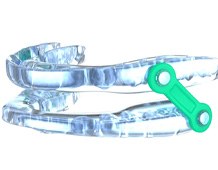
Obstructive Sleep Apnea – Baytown, TX
Treatment to Help You Breath Easier & Sleep Better

One of the most common disorders associated with making people struggle to breathe normally at night is obstructive sleep apnea. Otherwise known as OSA, this problem happens whenever there’s a blockage or obstruction in the airway, which can keep your airflow from moving freely and resulting in your body waking in a panic and struggling to breathe again. Fortunately, our team at Sleep Better Baytown can offer sleep apnea treatment to help with OSA! Keep reading to learn more about this specific kind of sleep disorder, or give us a call today to schedule an appointment!
What Causes Obstructive Sleep Apnea?

Obstructive sleep apnea can occur for various reasons, but most sleep professionals have determined that the soft tissues within the mouth specifically collapse onto the airway. As the throat muscles relax, they can end up falling back during sleep, creating a blockage and preventing smooth airflow. After 10 seconds or so without being able to breathe, your body will then wake up abruptly, causing you to gasp for air. In many cases, OSA can occur multiple times a night, or even around 100+ apnea episodes in rare instances.
Possible Complications of OSA

While snoring is one of the common indications of obstructive sleep apnea, it doesn’t always mean that you have sleep apnea. Other signs that you might be struggling with this disorder may include:
- High blood pressure
- Chronic fatigue
- Drowsy driving
- Frequent headaches, moodiness, and irritability
- Loss of libido
- Obesity/weight gain
- Diabetes
- Stroke or heart attack
- Heart disease
- Bedwetting
When Should I See a Doctor?

Should you suspect that you’re having difficulties with obstructive sleep apnea, it’s always best to contact our team at Sleep Better Baytown. Dr. Hutto will be more than happy to see you and evaluate your situation and symptoms so that he can determine if you require further testing.
For those who are unsure if they should see a doctor, you might consider doing so if you notice the following issues:
- You struggle with chronic fatigue, making it difficult to concentrate or even drive safely
- You have a hard time breathing during sleep, and you often wake up suddenly gasping for air
- You snore loudly enough and often to wake others up
- Your partner/spouse notices that you stop breathing while you’re asleep
Types of Treatment for Obstructive Sleep Apnea

When it comes to addressing obstructive sleep apnea, our team can walk you through some of the common methods for tackling the problem. Some of these treatment options include:
Oral Appliance Therapy
We can create personalized oral appliances that are designed to help position your lower jaw so that you can breathe more easily at night. These portable and easy-to-handle devices are meant to be worn during sleep, and they can be removed easily. Not only do these appliances help your airway avoid obstruction, but they can even help protect your teeth from clenching or grinding while you rest.
Continuous Positive Airway Pressure (CPAP)
One of the common ways to address sleep apnea is with a CPAP (continuous positive airway pressure) machine. These involve wearing a face mask that is worn during bedtime and provides air directly through your airway. While this method is quite effective, most patients claim that the device is rather bulky and loud, and it can be difficult to transport, making travel arrangements slightly more difficult for some.
Combined Therapy
Instead of only using one or the other, combined therapy involves utilizing a CPAP machine along with an oral appliance for treatment. With both methods, patients can enjoy reliability as well as comfort, as the CPAP device won’t need to be placed on its highest setting, and they can simply take their oral appliance should they choose to travel away from home. The additional comfort with this form of sleep apnea therapy also makes it more likely for patients to adhere to their treatment.